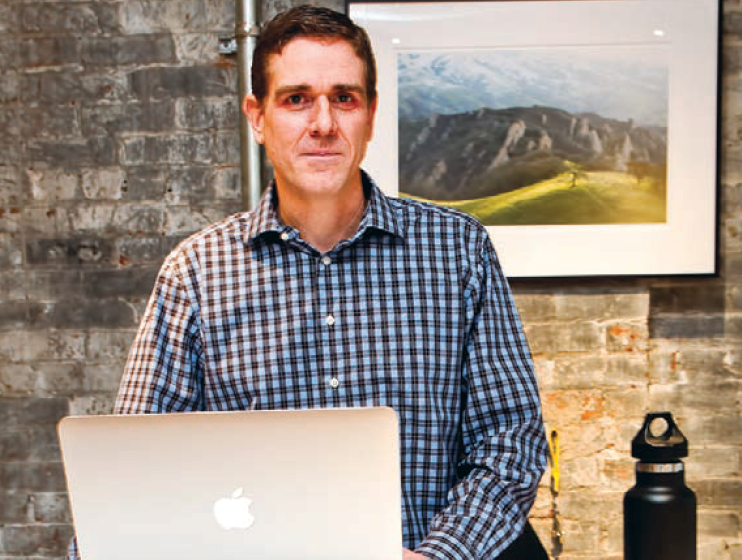Marty Reed has a new appreciation for trail running after having a rainforest dropped on him.
The CEO of Evok Innovations’ cleantech fund and recent San Franciscan transplant is an ultra-trail runner, which is loosely defined as a willingness to compete in a 100-mile race that usually has a mountain bolted onto it.
In August, Reed completed the Squamish 50/50, where racers run 50 miles and 50 kilometres on back-to-back days. Reed, 45, finished with a combined time of just under 22 hours, good enough for third in his age division.
While the Bay Area offers some great hills and open spaces, Reed’s immersion into the closed confines of North Shore trails has changed his running style to keeping more on his toes.
“It’s very different than running in the Bay Area,” said Reed, who now calls West Vancouver home. “You’ve got to pay attention because if you’re daydreaming you’re going to trip and hurt. The North Shore is deeply forested, rocky, steep and wet. But it’s beautiful: I love nature and being in the wilderness.”
Trail running is equal measures paying attention to what’s in front of you and keeping an eye on what’s required to make it to the end. An easy parallel can be drawn to early-stage cleantech companies looking to commercialize their novel technology: the route can be long and filled with many potential pitfalls to navigate.
Reed is not only a seasoned runner, but also well versed in helping tech companies reach the finish line, having spent 15 years affiliated with the respected and renowned Roda Group, a Berkeley-based venture capital company focused on identifying and growing early-stage high-tech businesses.
Well-regarded venture funds are like honey to startups, attracting a non-stop stream of solicited and unsolicited pitches. Roda chairman Roger Strauch said Reed deserves a lot of recognition in building the group’s current cleantech portfolio.
“In venture capital, if you open the door, throngs come in. Marty did a very good job of filtering out the kinds of investment opportunities we wanted to do, and I think that was a unique achievement. We are very proud of the portfolio of opportunities we have. Marty deserves enormous credit.”
Evok is a new partnership between the BC Cleantech CEO Alliance, Cenovus Energy (TSX:CVE) and Suncor Energy (TSX:SU). The two energy companies have each committed up to $50 million in funding over the next 10 years.
The alliance’s contribution to the partnership: leadership, industry validation, a diverse network and know-how.
The fund’s aim is to identify, invest in and help accelerate the commercialization of new technologies that improve both the environmental footprint and bottom line of oil and gas producers.
Although the Evok fund was announced in January, Reed has been “socializing” it since September, after relocating his wife and three children prior to the start of the school year. He’s already had hundreds of interested parties reach out to him. Having learned from his days at Roda, Reed is quick to parse out the winners from the also-rans.
“It’s simple: I need to know the problem you’re trying to solve, how you’re going to solve it, how you validated the solution is plausible or credible, who’s the team and what’s the business model. Those are the five key things,” said Reed, whose matter-of-factness is likely owed partially to his service in the U.S. navy and deployments in the Persian Gulf and the Adriatic Sea during the Bosnian War.
And, as with running, time is not to be wasted.
“If you want to make a successful pitch to me, Guy Kawasaki’s 10-20-30 is a great overview,” he added, referencing the marketing executive’s rule of 10 PowerPoint slides delivered in 20 minutes and written in large 30-point font.
Roda prides itself on being a company builder, rolling up its sleeves and providing hands-on assistance in helping startups grow up.
Strauch first came upon Reed in the late 1990s when he worked as director of finance at Roda’s Ask Jeeves, which sold for US$1.85 billion in 2005.
“Marty has the guts to take on something with a lot of uncertainty and adventure ahead [but] at the same time be steady and tenacious in pursuit of the associated objectives,” said Strauch.
Following Ask Jeeves’ acquisition, Reed was hand-picked as an executive for other Roda Group companies before formally coming onboard the venture capital firm in 2011. At that time, Roda decided to put all its eggs in one basket: invest only in technologies focused on improving environmental outcomes across the board. That suited Reed. “I have unbelievable passion for environmental issues and climate change. Roda was previously a tech investor but by the time I joined we were 100% committed to clean energy and climate change.”
Serving on the boards of Axine Water Technologies and Inventys Thermal Technologies, two Roda-portfolio companies based in Vancouver, Reed quickly grew to love Lotusland. Then word circulated in industry circles that a new cleantech fund was to launch in Vancouver. For Reed, the timing was perfect.
“I’ve been coming to Vancouver for years and had honestly fallen in love with the city. I thought it would make a wonderful place for my kids to go to school.”

(Image: Evok CEO Marty Reed at his workstation in the company’s Vancouver offices, backdropped by a photograph of one of his trail-running routes in California | Photo: Chung Chow)
Jonathan Rhone, president and CEO of Axine and chairman of the BC Cleantech CEO Alliance, welcomes Reed’s new permanent address. Rhone was immediately impressed on first meeting Reed as an Axine board member.
“Building technology companies is hard work and requires a high degree of intellect. Marty has a way of cutting through all the noise to get to the heart of the matter and come up with creative ideas,” said Rhone. “I just really, really appreciate that style.”
Reed’s approach also cuts a shorter path to training for future races. Work and family life willing, his goal is to run one weeknight and twice on weekends, even if it means getting up at 5 a.m. He doesn’t think he needs much more if he’s smart racing.
“It’s counter intuitive when you run longer that you don’t have to train as much. However, in a race, tactics and planning become more important.” •




